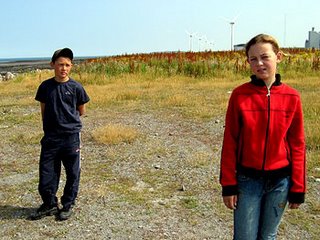
Someday My Prince (and other fables)
Laura Anne is an eleven-year-old girl from the seaside English town of Siddick who falls in love again and again. But the boys she goes for are almost incidental to this story. After all, they’re just dumb boys, and most several inches shorter than her. It’s not them she cares about. (Well, okay, a little.) But mostly she’s in love with being in love. That’s the premise for Someday My Prince will Come, a short indie documentary directed by Marc Isaacs and narrated in rhyming couplets by Laura Anne, whom the film follows over for a two-year period. I saw it recently at IFC and loved how funny and sad it is, how it draws you in without being the least bit cutesy or knowing. I hope it’s released on DVD so you can see for yourself what a lovely job the director has done.
Seeing it got me thinking about how much I appreciate stories about children-- and why I do. Two of my favorite movies fit this profile: Truffaut’s Small Change and Victor Erice’s The Spirit of the Beehive. I don’t think it’s purely because I’m a sentimental sap. I hate most media portrayals of kids, their use as parrots or props on television, or dolled up on film like fat robots programmed to giggle. Thank God she hasn’t made her way to the screen, but I refer you to the “work” of Anne Geddes, or to those packs of Hollywood cutie pies with just the right hair and lisp. I’m not even really wild about real children (except when they’re related to me—then I’m fanatic).
But from an artistic point of view, stories about children—good stories—provide us with the pleasure of dramatic irony. (Remember back to English class? That’s when we know how the story will end up, but the characters don’t.) For the child, the world at hand is monumental; it’s all she knows. But we’ve been through all that and survived. We know the ending, and it’s our confidence that in all probability she'll also make it through childhood (with its many slings and arrows) that lets us watch with pity and even a kind of protective love. It’s that gap—between her short view and our long one— that gives these stories their enjoyment. We want to save her, not just from hurt, but also from the hopeful melancholy of her innocence, and carry her swiftly to our safe, adult vantage point, though, of course, what we’ve got is no safer. No one, least of all some junior-high prince, flew down and airlifted us out of childhood. So the fictional child has to live through it, too: loved (if she’s lucky) but essentially alone. That’s what the good storyteller does—tells the world as it happens, without trying to fix it. And this is where Peter Pan’s creator J.M. Barrie got it wrong. He wanted to spare his characters from having to grow up, not knowing that for most of us, adulthood is precisely the vantage point we need to make sense of the most wonderful parts of childhood.
Next time I want to talk about a few authors who handle the themes of children and childhood well. So be thinking of books (and movies)! I’m most interested here in how childhood is communicated to adult audiences, though I'd love to hear about any children’s book or movie you love.
4 comments:
Jane, loved the post. I've always loved A Wrinkle In Time by Madeline L'Engle. I look back at those and other books and sometimes I get sort of sad realizing how easily I could get absorbed in the "Book World" when I was a kid, no distractions/no job/no dinner to fix. I think as a kid you are so naive that it helps you wrap yourself up in a story without even realizing you are doing so...
As far as the documentary, sounds really good!!
As a parent, I really appreciated this post.
And I have to second the nominations for anything by Madeline L'Engle and the Romona (and Beezus!) books. I also read a great many "Babysitter's Club" books growing up as well as the entire "Betsy, Stacy, and Tibb" series (I will never forget when Tibb turned 10), but I count those as casualties of having 3 sisters.
I didn't know boys read Babysitters Club! ha ha. I loved those books, I admit, and probably read them until I was too old to read them. ha.
And Erin, I loved Ramona as well. Anyone remember the book (I think it was "Ramona and Her Father') where she tries to get him to quit smoking and puts up a sign that says NOSMO KING and he he asked who NOSMO KING is or something? Anyways... good memories...
Good stuff--thank you, guys! I'll try to have part two up shortly.
Post a Comment